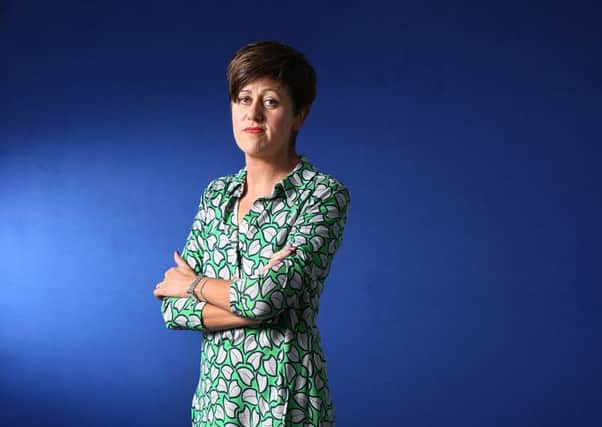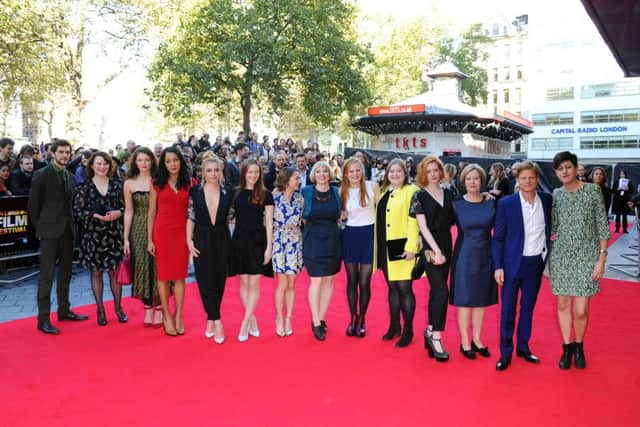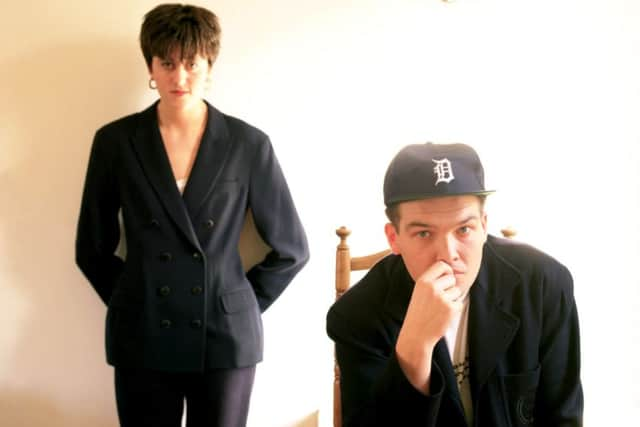Tracey Thorn finds fresh voice with new book


Tracey Thorn had an unforgettable nightmare. There she was on stage at the Albert Hall. She was singing and the audience was enjoying it, everything was fine. And then she looked down.
“I was naked,” she says. “The gig was going well, everything was OK, but I was naked.”
Advertisement
Hide AdBeing starkers in front of an audience is a pretty classic anxiety dream, but what’s interesting is that Thorn had actually sung at the Albert Hall. And it went brilliantly well. The audience listened attentively to her fine vocals, that tender, tentative voice of hers. She was, happily for her, wearing clothes and, unusually for Thorn, she knew at the time it was going well. So why the nightmare?


Actually, it entirely fits for a singer who has had a long and at times tortuous relationship with singing. Even after the success, there’s always the worry of how it might have gone wrong. This is, after all, the woman who auditioned for her first band by singing Rebel Rebel from inside a wardrobe so embarrassed was she to be performing.
Having written, Bedsit Disco Queen, one of the finest pop memoirs you could read about being an ambivalent pop star Thorn has now written another cracker of a book which also has ambivalence at its heart, this time about singing itself. “I do think of it as a bit of a follow on from Bedsit Disco Queen,” she says. “It’s not a sequel in the sense that it continues the story, it doesn’t pick up from the year I ended the last one. It’s almost like I go back to the start again but try to get inside the singing bit of the story because I did gloss over that a bit.”
Thorn retired from performing live in 2000 when Everything But the Girl had released a dozen albums. They’d made it, they had loyal fans, eager audiences, nothing left to prove. Thorn could have gone on gigging, riding the success they’d built over more than a decade. But instead she stopped. She had young children and wanted to be more focused on them, but there was another reason. Thorn had finally had enough of putting up with the stage fright she’d been battling for years.
It was at the readings she gave for her first book that she realised how big a part stage fright had played in her decision to stop singing live. More than that, she realised that she wasn’t entirely settled with how this had come about. “I mentioned in Bedsit Disco Queen that I was happy to have retired. But at the events people would still ask when I was next going to perform, and I thought I haven’t really addressed this, not even to myself completely.”


Part of the reason Thorn wrote Bedsit Disco Queen was that what she read in music journalism didn’t really capture what it was to be a pop star. “I don’t always recognise the tone of voice in which they talk about the creative process and the creative personality,” she told me when we met to talk about that book. “Sometimes it’s too reverent, sometimes too sentimental, sometimes too idealistic. When I meet other musicians they’re just not like that.” This new book is also designed to fill a gap – this time it’s about the experience of singing. Not just what voices do to those of us who listen to them and love or loathe them, but what they do to the person who sings.
Advertisement
Hide Ad“Why isn’t singing just wonderful? That’s almost the heart of the book,” she says. In fact, one of the titles she toyed with when she was writing it, was The Trouble with Singing. She laughs when she tells me it was deemed too negative. But really, that is Thorn’s interest. Here’s this activity that we do when we’re happy and when we’re sad, that lots of us venerate, idealise even. Plenty of us would give anything to be able to do it – not just carry a tune but really be able to belt it out. Yet Thorn’s experience of singing is that it’s far from straightforward. And she’s not alone. Sandy Denny, Dusty Springfield, Karen Carpenter, Linda Thompson – they are all women who struggled if not to find their voices then certainly to sustain them, or in some cases to live with them. Think about Janis Joplin or Amy Winehouse or Whitney Houston. Thorn explores how voices work and how audiences hear, what it feels like to have people love your voice and also the pain of when it won’t do what you wish it would. She ranges through literature, interviews other singers and includes a playlist that if you’re anything like me will keep you up far too late as you listen to songs you’ve not heard for years and others which are new to you. But most of all, Thorn gives the unique perspective of someone who knows what it’s like to stand behind the microphone. “This book is very personal,” she says. “It’s very much not a history of singing, it’s me exploring my own things and picking singers who’ve experienced something similar.”
The book isn’t a redemption story. Thorn doesn’t start off finding singing a bit tricky and end the book cured taking to the stage of the Albert Hall or the O2 and ready to sing her heart out. It’s not that that wouldn’t have been appealing, it’s just that it wouldn’t have been true. “The book didn’t solve anything,” she says. “There was a time when I thought I was going to have an epiphany moment and that’s how the book would end. But I’m glad that I didn’t do that because it would have been dishonest. I don’t think anything major is going to change. The only change is I’ve become a bit more forgiving of myself. I try to make my peace with where I am at now.” She laughs. “That all sounds a bit mindful and inclusive but it’s the only sane way I can deal with it really.”
Advertisement
Hide AdWhen I spoke to Thorn the last time, she was worried that having pulled the curtain back about her time as a pop star she’d have to face the fact that she couldn’t put it back. Her cover would be blown, everyone would now know about her awkwardness. How lovely that if anything the book added to her already considerable fan base – people responded to her wry wit and openness. She wasn’t exposed in a negative way, she was revealed and people liked what they saw. In Naked at the Albert Hall, it feels as though she’s finding even surer footing. Her first edit may be a process of removing all of the “perhapses” – “sometimes it’s nearly every sentence” – and she may be “terrified” about the book coming out, but Thorn has found her voice as a writer even if singing is a bit tricky.
Thorn grew up in a commuter town north of London. It was a pretty conventional beginning. Nice parents who listened to the Carpenters and crooners, a brother who listened to Fairport Convention, a convent school education without any particular incident. Then she discovered punk, got herself a guitar (which she didn’t realise needed to be plugged in to an amp – this didn’t worry her because she didn’t want to make very much noise anyway) and became the only female member of a local indie band. In the early 80s, while at university in Hull, she met Ben Watt, Everything But the Girl was created and Thorn’s role as the reluctant pop star began. Thorn never really felt that she fitted in as a pop star. And truth be told she’s never really felt like she fitted in as a singer. “I was taught never to show off,” she says. “That’s a big part of the complexity I feel about being a performer. You end up not quite knowing how to reconcile what you’ve been taught to be with what your job then requires you to be. I’m envious of people who have a more defiant attitude, who can be assertive and rebellious on stage.”
Thorn tried hypnotherapy to cure her stage fright, but it didn’t work. She says she was a bit dismissive, not entirely convinced. But there’s more to it. “I suspect that I wasn’t really committed to the notion of wanting to get back on stage,” she says. “I think for me over the last few years it’s been more a feeling of guilt that I ought to want to do it more. There are people out there who’d like me to do it more so I’m disappointing them, I’m letting myself down by not fulfilling a talent I’ve got. It comes out of a feeling of I should rather than I desperately want to. Until I get that feeling – and I don’t know if I ever will – then I probably won’t go back to it because it has to come out of desire, really urgent desire to do it.”
The book may have been a way of understanding her stage fright more fully but she isn’t, she says, making any “active attempts” to overcome it. When she pictures herself on stage it’s not with any sense of missing it or wishing that she was doing it. For her, it’s almost as though singing live is part of her past. “It’s something I did and sometimes I did it at a cost to myself and so I don’t look forward to going back to those feelings.”
To be fair to her, this makes complete and utter sense when you read how unpleasant touring could be for her. She had problems with her throat, her voice would often tire quickly, she sometimes worried it wouldn’t come out at all.
“I was a nervous wreck a lot of the time. So unable to live in the moment and enjoy being in the moment. People often say, ‘wow, you were so successful and you had such great crowds.’ But so many of my memories are of being back stage in the build up to going on and being really anxious, really nervous, knocking back a brandy and then another brandy sometimes, thinking about all the things that might go wrong.” What made it worse, more isolating, was that Thorn wouldn’t speak to anyone because she was trying to save her voice. “Everyone is in the dressing room having a lark or a beer and I’m in a corner or in a separate room not speaking.” It’s not as though once she was on stage things got easier. “I can vividly remember looking down at the set list and counting the songs, thinking how many have we got to go? How is my voice feeling? Oh god that one’s really hard. Rather than being immersed in the music I was listening to all these little voices in my head. That’s a shame I think.”
Advertisement
Hide AdAs well as interviews with a number of singers which are both fascinating and revealing, Thorn writes about singers who interest her or to whom she’s been compared. Karen Carpenter trying in vain to be allowed to sing from behind her drum kit because that’s where she was most comfortable. Dusty Springfield struggling with “white soul singer’s inferiority complex”. Thorn quotes Springfield as saying: “All I know is that I have a distinctive voice I don’t particularly like listening to.” How awful, I say. What a tragedy. “It does feels tragic,” Thorn says, “especially given that many, many people love her voice. You’d think she would have at least understood something from that. See, I’m not as hard on myself as that.” So does she like the sound of her own voice? “I do,” she says. “I can see its strengths. Absolutely.” She smiles. “I don’t mean to imply it’s all bad. And I still have a sense in my mind that there probably are people for whom it is wonderful or at least less problematic and I’m incredibly jealous of them, as jealous as someone who can’t carry a tune might be of someone who can.”
Thorn does still sing. Since Everything But the Girl came to an end, she has released three solo albums that have been well received by fans and critics. And recently she’s branched out into creating a soundtrack. She’s written and performed the music for The Falling, the new film from director Carol Morley. Set in a girls school where there is an outbreak of hysterical fainting, it’s a languorous, funny and fascinating film. Thorn and Morely met briefly at one of Thorn’s readings and hit it off. “Carol told me that she had a dream one night that I’d done the music for the film,” Thorn says. “She got in touch with me the next day to tell me about it and ask whether I’d want to do it.” Thorn, self-deprecating to her core, said she wouldn’t know where to start. Happily for Morley that was perfect.
Advertisement
Hide Ad“There’s a scene in which the girls form what they call the Alternate School Orchestra,” Thorn says. “They’re playing the xylophone and triangle and recorder. Carol sent me the box of instruments they’d used in the film so I used those as the starting point for the music, as though the girls themselves were making it.” She may be unfailingly modest but it’s clear that she’s pleased with what she’s done. There was no terror in this project she says and she “loves” the film. “It does strike me as one of those fortuitous things where her film and the way I wrote the songs just naturally fit, they gel, so there wasn’t much of having to stretch and bend to make it work. It was really wonderful.”
The fact that Thorn’s book and Morley’s film have come out in the same week is a fluke, but Thorn’s rather enjoying that her soundtrack shows that despite having written a book, which amongst other things, is all about the angst singing causes her, she’s still doing it. “I do still get an enormous amount of pleasure from doing it,” she says. “But on my own terms. It still has meaning for me. I haven’t given up.”
• Naked at the Albert Hall is published by Virago, £16.99; The Falling (15) is in cinemas now.